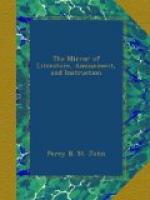productive of a wholesome effect in society, through
their aim and power to awaken sympathy and respect
between classes whom fortune has placed asunder, surely
this old man’s verses ought to meet with no
cold reception among those who appreciate the value
of kindly relations between masters and dependents.
In them they will trace the natural influence of that
old system of manners which was once general throughout
England; under which the young domestic was looked
after, by his master and mistress, with a sort of parental
solicitude—admonished kindly for petty faults,
commended for good conduct, advised, and encouraged—and
which held out to him, who should spend a series of
years honestly and dutifully in one household, the
sure hope of being considered and treated in old age
as a humble friend. Persons who breathe habitually
the air of a crowded city, where the habits of life
are such that the man often knows little more of his
master than that master does of his next-door neighbour,
will gather instruction as well as pleasure from the
glimpses which John Jones’s history and lucubrations
afford of the interior machinery of life in a yet
unsophisticated region of the country. His little
complimentary stanzas on the birthdays, and such other
festivals of the family—his inscriptions
to their neighbour Mrs. Laurence, of Studley Park,
and the like, are equally honourable to himself and
his benevolent superiors; and the simple purity of
his verses of love or gallantry, inspired by village
beauties of his own station, may kindle a blush on
the cheeks of most of those whose effusions are now
warbled over fashionable piano-fortes.
The stanzas which first claimed and won the favourable
consideration of the poet laureate were these ‘To
a Robin Red-breast:’
“Sweet social bird, with breast
of red,
How prone’s my heart
to favour thee!
Thy look oblique, thy prying head,
Thy gentle affability;
“Thy cheerful song in winter’s
cold,
And, when no other lay is
heard,
Thy visits paid to young and old,
Where fear appals each other
bird;
“Thy friendly heart, thy nature
mild,
Thy meekness and docility,
Creep to the love of man and child,
And win thine own felicity.
“The gleanings of the sumptuous
board,
Convey’d by some indulgent
fair,
Are in a nook of safety stored,
And not dispensed till thou
art there.
“In stately hall and rustic dome,
The gaily robed and homely
poor
Will watch the hour when thou shall come,
And bid thee welcome to the
door.
“The Herdsman on the upland hill,
The Ploughman in the hamlet
near,
Are prone thy little paunch to fill,
And pleased thy little psalm
to hear.
“The Woodman seated on a log
His meal divides atween the
three,
And now himself, and now his dog,
And now he casts a crumb to
thee.




